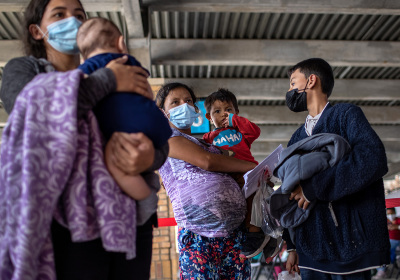Meeting the needs of mothers

In every nation around the world, mothers are integral to the societies in which they live. Regardless of location or culture, the impact mothers have on their surrounding environments is immeasurable. There is something so indescribably special and intrinsic about a mother’s love, teaching, and care. Mothers have the power to transform their worlds, specifically through their attention to education, economic influence, and value teaching. When mothers are taken care of, their children are as well.
Yet, when mothers have yet to know great examples of love and care, the ways in which they are able to serve their families are equally impacted. Moms can only educate their children as far along as they themselves are educated; they can only provide the healthcare instruction and nutrition wisdom they themselves know; they can only teach their children to earn in similar capacities as themselves; and they can only exhort and speak fulfillment to the point that they know their own identity.
Most parents are inclined to raise their children in ways that mimic the way they themselves were parented. This is applicable in every country, culture, and setting. It is only when mothers are taught differently, learning and making the conscientious effort to change and grow, that these cycles can be regenerated, ultimately creating new, healthy motherhood patterns and establishing ripple effects of loving change for generations to come.
1. Healthcare provision
Many moms around the world have yet to be educated about decent prenatal care, healthy birthing processes, postnatal recovery, sufficient maternal care, and nutrition. A number of these women enter into pregnancy malnourished and ill from within an unsupportive environment. Oftentimes along the way, they are then faced with the challenge of figuring out how to give birth (often in unsanitary conditions), provide for their families and care for their little ones all alone.
When wellness programs are implemented to help educate these mothers about healthy foods to feed their children, how to monitor symptoms of illness, how to best care for their own bodies, and about the medical and professional resources available to them from within their own communities, they are set up for significantly healthier lifestyles for both themselves and for their families.
2. Education and growth
In every society, the working contributions mothers undertake greatly affect the cultures in which they live. Whether the work they do is from within their home, from an office space or from a market with a baby strapped to their chest — most of these mothers do the best they can with what they have.
However, given the fact that most of the women in these third-world nations have no education, minimal skillset training, and extremely limited resources, their ability to grow their knowledge, advance their economy and improve their quality of living is primarily stunted, thus leaving these communities in ongoing cycles of poverty and societal deterioration.
When educational initiatives are put in place to help teach these women about new skills that will make work more effective, efficient, economical, and life-giving, we are setting these women up for more — more life, more success and more fulfillment. When mothers are educated and experientially stretched, they are able to offer enhanced teaching and wisdom to their children — thus, improving their homes comprehensively and establishing a foundational precedent for the ongoing development of their posterity.
3. Opportunities to love: Teaching about true identity
God cares about each and every mother on this earth — just as he always has throughout the course of history. This is evident throughout scripture.
In fact, just like within many of these third-world nations today, the cultures we read about in the Bible treated women like property, with little to no rights, no voice, no education and no autonomy over their own bodies. Yet, the women of this time and place were seen and loved by Jesus. Jesus treated them with respect, to teach them and to give them a voice. Even in his dying moments on the cross, he asked John to care for His mother.
In the same way today, Jesus cares about these women — the mothers in the developing world who are overlooked, neglected, mistreated and abused. While the majority of these moms might feel alone, lost and without value, this is not how God sees them. He sees them as beautiful, worthy and treasured. When those who are more privileged can offer this profound, life-giving message to these women regarding their value, they are gifted the truth about what Jesus says about them; they are provided a glimpse into their true identities in Christ.
When we meet the needs of these mothers in the capacities of healthcare and education, we are not only contributing to their quality of life and their society wholistically — we are also opening the door for opportunities to show them Jesus. Through the process of authentic servitude, we are able to share with them the love of Christ, the powerful message of the Gospel and the fulfilling Kingdom value they personally hold — regardless of the false counter-message society has made them to believe about themselves.
David Vanderpool, MD, is co-founder and CEO of LiveBeyond, a faith-based humanitarian organization bringing general medical care, mother and child healthcare, nutrition, clean water, education, and community development to people worldwide. In 2012, LiveBeyond established a compound with all of the above in Haiti, and last year launched a program for children with disabilities in Israel. For more information, see www.livebeyond.org.



























